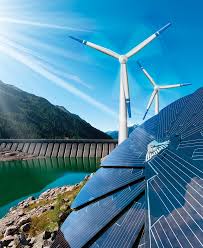For the region’s economic growth to be accelerated and to solve energy poverty, it needs customized energy solutions.
According to expert perspectives gathered by the German consulting firm Roland Berger during the Middle East and African Energy Week, the region can achieve its energy transition and even support Europe if it adopts customized solutions.
A poll focusing on 11 energy priorities, from “driving exit strategies for coal” to “resilience of energy systems,” was required of participants in the index.
According to the report, increasing renewable energy is essential to transforming the area into a global centre for green hydrogen and reducing greenhouse gas emissions as well as the region’s dependency on fossil fuel economies.
“This is an area where technology is already mature and implementation therefore relatively straightforward,” said Pierre Samaties, partner at Roland Berger’s Middle East office in Dubai.
With over 46 green hydrogen projects underway in MENA (Middle East and North Africa), the region is a “good fit” to produce the alternative energy source with the support of renewables and existing regional export infrastructure and financing resources, Samaties added. Oman, the UAE, and Egypt notably lead the regional transition as they together host 27 green hydrogen projects in the region.
The consultancy firm further noted that the MENA region can use renewables to decarbonize its industries and ease its reliance on fossil fuels while Africa is facing an “energy trilemma” that requires the “right balance between affordability, reliability, and sustainability.” In other words, the continent has to address energy poverty and unequal access to power while moving from coal to renewables.
Taking the case of Morocco, the North African country works on expanding the share of renewable energy in the electricity mix to up to 80% by 2050. Still, the regional leader remains reliant on energy imports (oil and natural gas).
Coal continues to be a major source of power for local industries and even households in some regions. The country has also not yet committed to a net-zero goal.
Recommendations
While the energy transition seems simple on paper, its implementation remains challenging due to the lack of on-scale and affordable carbon capture and energy storage technologies.
The development of a “clear, stable policy framework” for decarbonization projects and their investments is also needed to ensure the sustainable flow of money to support the development of renewable energy projects.
Recommending a step-by-step phase-out of coal, Roland Berger noted that countries in the Middle East and Africa have developed adequate policies to regulate and finance the energy sector. Furthermore, countries can support technological innovation to reduce the cost of new technologies used in capturing carbon and storing it, but also for storing the energy surplus. All of this while minding the rise in regional CO2 emissions, up 50% between 2005 and 2021.
The German consultancy firm thus recommended the adoption of electric solutions – powered by renewables – in the heating and transport sectors to cut emissions.
Carbon capture and storage (CCS) provide additional support to mitigate the climate impact, the company added. It further noted that short and long-term storage technology such as converting power to hydrogen and other intermediary fuels appears to be crucial in securing a sustainable supply of energy. The use of digital solutions can also maintain a safe and reliable setup, maintenance, and operation of the future energy grid.
While storage and capture technologies remain expensive, the introduction of low-interest green financing is set to contribute to the re-invention of the energy business models to accelerate decarbonization efforts by securing long-term payment dreams over the investment period.
The introduction of an overarching regulatory framework for green energy is, as Roland Berge put it, essential to ensure a cost-effective reduction of carbon emissions as well as adopt carbon-pricing mechanisms.

